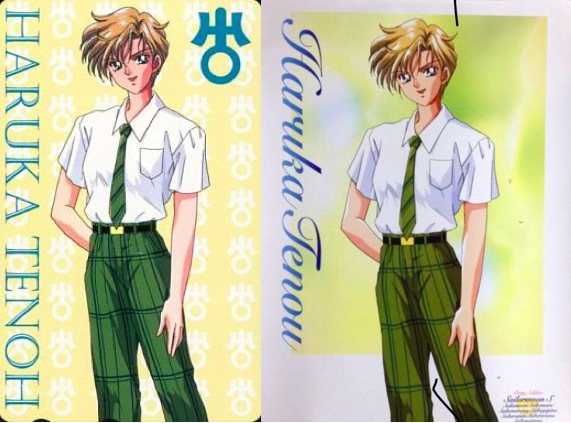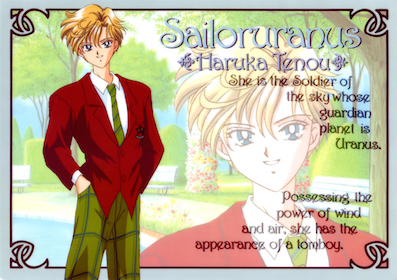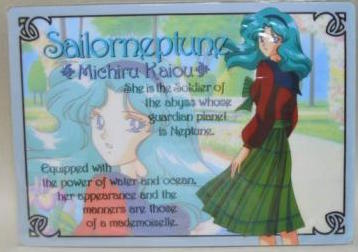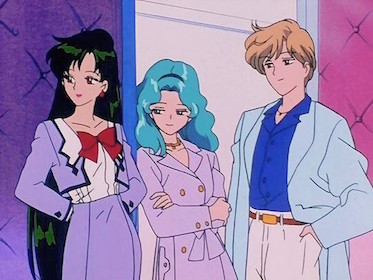While I’m sure I’ve made quite a reputation for myself about being a stickler for the every little tiny detail in the Sailor Moon universe, I’m just going to say up front that I find it absolutely absurd that fans even argue about this.
And argue they do! As someone who’s been a part of the Sailor Moon internet community since the late 90s, I can say that I’ve seen this argument come and go since the earliest days of the fandom.
So, since this is a question I see from time to time in my inbox and DMs, I figure it’s time I throw in my 2.27 yen!1 What is the correct spelling?
To get the obvious stuff out of the way first, this same issue obviously also applies to Michiru Kaiou/Kaioh and Setsuna Meiou/Meioh as well, but I need to keep titles within 70 characters, so that wasn’t gonna work. I’m sure you understand.
As for what my take on this whole issue is? Honestly, even though you probably know me for being obsessively pedantic, this is an issue that I really don’t think it matters — as long as you’re consistent. Just like how you can have a Kris, Chris, and Cris all pronounce their names the same way, Tenoh, Tenou, and Ten’ou are all valid spellings for a name pronounced the same way.
Anecdotally speaking, in my decade of living in Japan, I’ve met multiple people with the same first or last names that spelled them differently. The fact of the matter is, there’s no “correct” — as in required — way to convert a Japanese name into latin characters. But there certainly are conventions and systems. And that’s where the confusion comes from.
You see, there are two major systems in use for rendering Japanese into the alphabet we all know and love, otherwise as “romanization”:
Going deep into the differences on these is beyond the scope of this article, but what you need to know the that basically Hepburn errs on the side of “how does it sound when spoken” while Kunrei-shiki errs on the side of “accuracy to what’s written.”
Example:
| Japanese | Hepburn | Kunrei |
| ちびうさ | ChibiUsa | TibiUsa |
| せつな | Setsuna | Setuna |
| シャオラン | Shaoran | Syaoran |
“Enough with the jibba jabba,” I hear you say in your best Mr. T impression, “just tell me which is the official one!”
They’re both the officially-adopted way of romanizing, depending on what ministry or branch of government you happen to be corresponding with. The National Diet Library, for example, uses Kunrei while the Ministry of International Trade and Industry uses Hepburn. Because why not?
More important to our discussion today, though, is that the Japanese passport office highly recommends using the Hepburn system for the romanization of your name on your passport.4
So what do they recommend about how to write down a name that ends in おう (ou), or basically an extended vowel? The advice is to cut it off. Meaning that the “correct” way that the passport center would like Haruka, Michiru, and Setsuna to write their names would be Teno, Kaio, and Meio respectively.
However, if you make a request, they will allow you to use non-Hepburn forms such as -oh or -ou.5
Going back to our original question, what does this all mean for the correct spellings of the Outer Senshi’s names?
What it means is that there is no correct answer, and anyone who tells you otherwise is wrong. Since Haruka, Michiru, and Setsuna are — brace yourself! — not real, they have no passports or identifying documents to check. Official Japanese source materials are also all over the place, so you can’t rely on that either.
The only thing that does matter is that you’re consistent with how you use it. Personally, I prefer the spellings Tenoh, Kaioh, and Meioh because… well, they look more like last names to me. That’s it. But I’m consistent throughout my articles, and that’s what matters.
So with that out of the way, I’d love to know what your preferred spellings are and why! And not just for this, but for some of the other oft-debated names. Do you spell it Chibi Usa/ChibiUsa/Chibi-Usa? Is there a space in SailorMoon? Let me know!
References:
- $0.02 USD, as of December 22, 2017 ↩
- See Hepburn Romanization (Wikipedia) ↩
- See Kunrei-shiki Romanization (Wikipedia) ↩
- See the Kanagawa Passport Center ↩
- See Using Non-Hepburn Spellings ↩





I use Tenoh, Meioh and Kaio don’t know why I take away the H from Michiru’s last name it just makes sense to me. I never knew people argued over this. *sighs* oh and Chibi Usa for me.
On the internet, people will always find a way to argue about anything and everything. Such is the way of the world. =D
Interesting how you write out Kaio differently. I’m not sure what other anime you may have been familiar with when you first became a fan of Sailor Moon, but off the top of my head, Kaioshin and the Kaio-ken from Dragon Ball Z come to mind. Maybe that influenced you?
As an anime fan, I definitely prefer Tenou, Meiou, and Kaiou. For someone with a basic understanding of the Japanese language, those spellings do the best job of telling me exactly how their names are supposed to be pronounced. I really don’t like romanization of names and words that shorten words or spell them differently… especially when it’s inconsistent.
For instance, I think I’ve seen four different spellings for “birthday” in four different books that teach basic Japanese. You have tanjoubi, tanjobi, tanjōbi, and tanjoobi. Actually, I’m surprised I haven’t come across a tanjohbi in addition to that. I think anyone learning Japanese should understand what “ou” sounds like and there’s no need to adjust the spelling of the word… it should be tanjoubi.
Back to the last names though, that’s a slight exception because I’m totally fine with Tenoh, Kaioh, and Meioh. If I was a Japanese person with one of those last names, and I was coming to America and wanted my name to be pronounced correctly by people who aren’t familiar with Japanese, I would choose that spelling. It’s different because this time your target audience is people who have no idea how to pronounce Japanese.
As for Usagi’s daughter… there’s a reasonable argument to be made for any of the spellings, really. Personally, I treat it like an actual name so I go with Chibiusa. I guess it doesn’t make a lot of sense that I do that but I also dislike seeing “SAILORMOON” without a space in it.
As part of my major in Japanese, I had to take several classes on Japanese linguistics. You wouldn’t believe all the insanity involved in trying to find the “perfect” romanization system, especially when you consider all the edge cases. The し (shi) in でした (deshita), the past-tense form of the copula です (desu), is typically truncated to sh, for example. Or when a ん (n) comes before a voiced bilabial fricative,[source] such as しんばし (shinbashi), it becomes an m sound, thus Shimbashi is correct in terms of how it’s actually pronounced.
So yeah, romanizing Japanese is a total nightmare.
As you brought up, though, it really depends on who the target audience is. Personally, I believe that manga and anime translation should be treated as assuming that the reader doesn’t know any Japanese words, pronunciation, or anything about the phonetic structure… but I think that’s a minority opinion in the way manga is translated nowadays.
And if we want to get REALLY technical, the correct way to write out Haruka’s last name should be Ten’ou, since both てんおう (te-n-o-u) and てのう (te-no-u) are both rendered the same. But no one reasonably wants that, I hope.
Hey there! Love your articles & I follow on Twitter. I too, spell the outer senshi last names with the h. As for Chibi-Usa, well, there you have it. (-;
As I also grew up watching SM in the 90’s, I remember seeing Hepburn spelling on everything I could get my hands on. (I still have it all.)
Food for thought: do you think the S.O.S. campaigns in the 90’s for the anime in North America were successful? Who heard our pleas? I remember writing letters, but I forget to whom, exactly.
Interesting question on SOS! Honestly, I don’t think any of their individual campaigns were successful (insofar that I don’t think any of the companies they petitioned to actually acted upon all the letters, petitions, etc. that they received), but I think it did have an effect in aggregate, in getting the message out there online and in creating a massive, vocal fanbase so when Cloverway and Cartoon Network started to actually pick up anime, it was clear to them that Sailor Moon had a viable market.
… if that makes any sense.
I remember the SOS print outs in around 1996 that were intended to be sent to Cartoon Network. They were petition style and I had to mail a bunch of them out myself. No idea If any of our work is what eventually got it on CN or not though.
As for for Small Lady, I spell it ChibiUsa. Back in the 90s I used to spell Sailor Moon as Sailormoon because I saw merchandise that spelled it that way so I was convinced that was the “right” way.
Ah, I remember back in the days of the Great Sailormoon Debate.
In terms of how the product was marketed in Japan when written in English, it made a lot of sense. Heck, I was one of the diehard “Sailormoon” supporters too. But looking at it all in aggregate now, it all seems so silly to try to assert that it’s the proper way to interpret the name.
Yeah haha. I feel silly when looking back on it. But I guess we didn’t know better back then!
I would personally go with -ou myself as well. I feel like -oh is better used in situations where う is not used to extend the お sound (in other words, おお=”oh” and おう=”ou”). I know they are pronounced the same, but I appreciate when the romanization can clue me in on how the word is written in hiragana.
For the same reason, I vastly prefer putting an apostrophe after the N in Haruka’s last name. It’s てんおう, not てのう. The two are pronounced differently (they’re just literally not the same at all) and therefore they should not be written the same imo.
So personally I would go with Ten’ou.
It’s always interesting to me just how many different opinions there can be over something as seemingly simple as a name. And yet, all of them can be right.
I see accuracy in Ten’ou, and agree that if it’s being used to get across information to people who know some Japanese, it’s useful. But from a purely localization standpoint, I find it to be clunky and less intuitive to native English speakers who have zero knowledge of Japanese. All personal preference on my part, though!
Germany just wrote them Haruka Tenno, Michiru Kaio, Setsuna Meio and Hotaru Tomoe for that matter. It would make sense as even if my husband’s name contains a long u sound, it’s just u on the passport and not just uu or uh or with a symbol on top of the u. Why should anyone do it in simple names? Nobody would ever dream of writing Toukyou or Tohkyoh.
One may argue that a long or short vowel may be necessary in transcriptions of texts. But we’re just talking names.
Tokyo, Kyoto, Osaka, and other major Japanese locations are a different problem altogether, because their names have been used for hundreds of years now, so previous customs apply.
As for names, I knew an Ota, Oota, and Ohta at my last company. They were all spelled with the same kanji, and yet all chose different spellings. I’m betting that a lot of it comes from however the person decided to spell it on their passport application, maybe even how their parents had written it on their passport decades ago, or even just from how their English teacher spelled the name.
There’s technically no “right” answer.
Actually, for more precise pronunciation, it should be spelled as Haruka Ten’oh or Haruka Ten’ou, but most English-speaking fans do not care about that 🙂
I’ve only ever run into the n’ usage of ん in the west when dealing with Japanese language or history textbooks.
I always wonder if most native English speakers would even know what to do with a random apostrophe in the middle of the word, like with Ten’oh.
Looks like a Star Trek villain name to me. o_o
It’s not just native English speakers. The Japanese did or even do the same. Just compare 天王 to 天王寺 to even 天皇. For h.ll, even 天王 has てんのう as an alternative reading. So it’s only fair and good to leave out the ‘ .
I used to write “Tenoh” and so on, but I’m trying to use “Tenou” now. Because when I romanize Japanese, I always write the long o as “ou”.
I write Chibiusa, because how I saw the name written by other people in most cases. I know, it’s a combination of 2 words, but it makes a new name.
Yes, for me there is a space in Sailor Moon. xD And I know, both are correct, but in my head it always seems a bit wrong if someone writes it without a space.
I have a different question! Is it Tenou or Tennou? I mostly read Tenou online. But when I look up the kanji for her name in online dictionaries (such as Jisho) they say it’s Te-n-nou! (Same for the planet name.) Apparently there’s two On-reading for 王 : ou and nou. (You can see that on Jisho).
The weird thing is, though most people seem to spell it “Tenoh”, they do spell it “Shitennou”, though this word has the same kanji.
Technically speaking, the best way to write it if you were interested in directly representing the Japanese would probably be Ten’ou. Alas, I find it hard to read and not exactly easily accessible to people who haven’t studied Japanese.